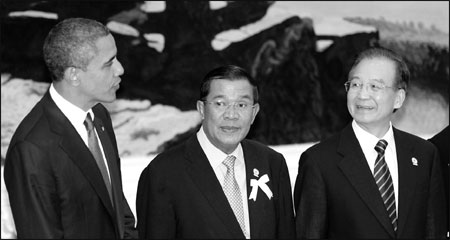China remains an 'engine' in global economy
Updated: 2012-11-21 08:11
By Qin Jize in Phnom Penh, Cambodia and Cheng Guangjin in Beijing (China Daily)
|
||||||||
|
US President Barack Obama chats with Cambodian Prime Minister Hun Sen and Premier Wen Jiabao during the 7th East Asia Summit Plenary Session in Phnom Penh, Cambodia, on Tuesday. Vincent Thian / Associated Press |
Wen urges ASEAN members to tackle international financial crisis
China will continue to be an important engine for the regional and world economies, said Premier Wen Jiabao on Tuesday, referring to the Chinese economy as "stable" and maintaining "relatively fast growth".
Wen made the remarks at the 7th East Asia Summit gathering leaders of the 10 members of the Association of Southeast Asian Nations and world economic powers Australia, India, Japan, New Zealand, South Korea, Russia and the United States.
The Chinese economy is becoming more stable and is expected to maintain relatively fast growth and develop to a higher level, said Wen.
Members of the East Asia Summit should make great efforts to do their own business well, and be all the more mindful of potential perils and responsibilities, he added.
Wen also suggested that members make more powerful policies and measures to deal with the international financial crisis, stabilize finances, revive their economies, increase employment and improve the people's livelihood, which are the most direct and efficient ways to contribute to regional development.
The summit is taking place at a time when the world is still facing economic uncertainties and other challenges, such as soaring oil prices, food security, natural disasters and cross-border crimes, said Cambodian Prime Minister Hun Sen in his opening address.
"These obstacles cannot be tackled at the regional level, but need closer cooperation as well as comprehensive approaches at both the regional and global level," Hun Sen said.
In this context, he said, constant cooperation and deeper integration among countries participating in the summit would be the best way to address these problems.
It was the second time that the US and Russia joined the summit since both were admitted to the regional forum in 2011. The forum is committed to East Asia integration and provides a valuable opportunity for leaders to discuss key strategic, political and economic issues of common concern.
South China Sea
Wen also explained China's stance on the South China Sea issue in a closed-door meeting of the 7th East Asia Summit on Tuesday.
"Huangyan Island is China's inherent territory, and there is no question over its sovereignty. It is proper and necessary for China to safeguard its sovereignty. China's position on the South China Sea issue is clear and consistent. We attach great importance to peace and stability in the South China Sea and regional freedom of navigation and security, which has been fully protected, and we hope that the position of the South China Sea as an international waterway will be guaranteed."
"China adheres to the policy of good-neighborliness and friendship, and is committed to regional stability in the South China Sea. We have effectively responded to regional emergencies which were not provoked by us. China and ASEAN signed the Declaration on the Conduct of Parties in the South China Sea a decade ago, and we reached an agreement on the principles. We do not want the South China Sea issue to be internationalized. With the restoration and development of the world economy, we hope that the South China Sea will be more fully utilized."
At the end of the forum on Tuesday, negotiation for a new regional economic partnership was officially launched.
The Negotiation on the Regional Comprehensive Economic Partnership consists of 10 ASEAN nations and six key Asia-Pacific powers - China, Australia, India, Japan, South Korea and New Zealand.
Through the economic partnership, "ASEAN's five existing free trade agreements with six countries (China, Japan, South Korea, India, Australia and New Zealand) in the region would be brought under one umbrella agreement," said ASEAN Secretary-General Surin Pitsuwan.
The partnership reflects the consensus of countries in this region and points out a clear direction for regional economic integration, which is of great significance, said Wen.
"China will fully support ASEAN in this process," he said. The negotiation is expected to be completed by the end of 2015.
Contact the writers at qinjize@chinadaily.com.cn and chengguangjin@chinadaily.com.cn
Xinhua News Agency contributed to this story.
(China Daily 11/21/2012 page11)

 Relief reaches isolated village
Relief reaches isolated village
 Rainfall poses new threats to quake-hit region
Rainfall poses new threats to quake-hit region
 Funerals begin for Boston bombing victims
Funerals begin for Boston bombing victims
 Quake takeaway from China's Air Force
Quake takeaway from China's Air Force
 Obama celebrates young inventors at science fair
Obama celebrates young inventors at science fair
 Earth Day marked around the world
Earth Day marked around the world
 Volunteer team helping students find sense of normalcy
Volunteer team helping students find sense of normalcy
 Ethnic groups quick to join rescue efforts
Ethnic groups quick to join rescue efforts
Most Viewed
Editor's Picks

|

|

|

|

|

|
Today's Top News
Health new priority for quake zone
Xi meets US top military officer
Japan's boats driven out of Diaoyu
China mulls online shopping legislation
Bird flu death toll rises to 22
Putin appoints new ambassador to China
Japanese ships blocked from Diaoyu Islands
Inspired by Guan, more Chinese pick up golf
US Weekly

|

|







